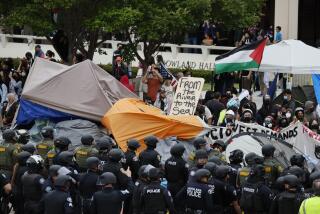Opinion: Why UC Berkeley got it wrong on Bill Maher’s speech
- Share via
There’s been a great deal of celebration about UC Berkeley sticking to its invitation to Bill Maher as a commencement speaker. Free speech in the cradle of the free speech movement, students should be open to provocative views that differ from their own, and all that. Maher’s invitation was decried by some student groups because of his recent questioning of Islam as a religion that he saw as perhaps inherently more violent and intolerant than others.
I think Cal is wrong.
Don’t misunderstand. As a journalist and a fierce advocate of the right—the necessity—of providing forums for uncomfortable and dissenting speech, I think Maher and all manner of such speakers belong on campus, almost all the time.
Just not at commencement.
Commencement is a ceremony that belongs to the graduating students and their families. And though many of the best commencement speeches discomfit their audiences—what better way to inspire people to action than by making them uncomfortable with the status quo?—no racial, ethnic or religious group should be made to feel unhappily singled out on that day. Not that Maher would go out of his way to diss anyone during his speech—though you never know, the guy eats provocation for breakfast—but his comments would be hanging like a cloud over the ceremony for Muslim grads and their families.
In other events at school, students have the option of attending or not attending. In a classroom, they’re in attendance to learn about ideas that might not mesh with their own. But at a commencement ceremony, students are something like a captive audience, unless they want to give up this moment they’ve been working toward all these years, at their own ceremony.
My two older kids are Cal grads, and I try to think of what it would have been like for us if the commencement speaker at one of their ceremonies had been Helen Thomas, the late White House correspondent who toward the end of her career said that the Jews should leave Israel—which she refused to recognize at all, calling it Palestine—and go back to where they came from, including Poland. In our family is an aunt who survived the concentration camps, including Auschwitz. She was one of Schindler’s Jews. In a refugee camp after the war, she had nowhere to go, no country that would open its doors to her. She emigrated to then-Palestine, helping to found a kibbutz in the Negev where she still lives. Several of my husband’s family live in Israel; he himself was born there shortly after it became a nation.
In many settings, I would have attended a speech by Thomas, who had many interesting things to say on a number of topics. I didn’t need to feel comfortable with her or everything she says to listen to her. But not on the family’s big day of celebration. We would have sat there seething the whole time, even if her speech was about the foibles of the Reagan White House. Or rather, our family would have skipped the ceremony. We don’t need umbrage on that particular day.
Everything about college has become an arms race these days, including the race to find the biggest and often most controversial names as commencement speakers. I wish when they looked for provocative commencement speakers, they would define provocative a little differently: Stimulating deeper thought in all new grads and their families about what’s happening around them, and their own role in world events. Personally, I’d vote for finding less famous but nonetheless inspiring voices to give the commencement address, and donating the fat speaker’s fee to charity instead.
Follow the Opinion section on Twitter @latimesopinion
More to Read
A cure for the common opinion
Get thought-provoking perspectives with our weekly newsletter.
You may occasionally receive promotional content from the Los Angeles Times.











